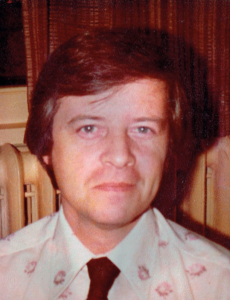
Bub
At one point, Shirley MacLaine had told us to contact our soulmate. I had always thought of soulmates as romantic connections, but to my surprise the soulmate who showed up was my cousin Charlie Reilly, known to his family as Bub. He was seven years older than me, and to me he seemed a larger-than-life adventurer, going from one thing to another, laughing, fighting, and turning anything that happened to him into an entertaining story. I admired him greatly, if more or less from a distance.
Besides, I owed him.
In the early 1960s, Bub was drafted into the Army, and one day, on leave, he stopped by to chat. My mother (“Aunt Vee”) and I talked to him about this and that as he and mom drank coffee. I can’t remember anything we talked about, but it was perhaps the only real conversation he and I ever had. Later, in a letter to my mother, he said that he had been surprised at how mature I was. My mother didn’t want me to see this, for fear I would get a swelled head, but in fact I desperately needed that indirect reassurance., and silently clung to it.
A few years later, he was responsible for my getting my first real job after high school. He was even the person who introduced me to drinking coffee! And he was the first newsman in the family That had its effect.
In all, I didn’t have any difficulty in thinking of him as a soulmate. I lived in hope that he would write novels. Assuming that he could make the translation from speech to print, what lively things his novels would have been!
But it was not to be. Before enough years had gone by to diminish the effect of so much difference in our ages, his life and mine had gone in different directions, and we were rarely in the same place at the same time. Also, political and other differences assured that he and I would have required time and effort to get on the same page. Before that could happen – if it ever could have happened – he was dead at age 39, killed by fire, attempting to rescue his girlfriend’s little boy.
After the Higher Self Seminar, I went back and found a poem I had written in the immediate aftermath:
Night Snow
His possibilities dead, behind him
He leaves crystallized rationalizations
And a thousand cigarette butts and
Tickets to every sporting event within a day’s drive.
And memories. And plastic idols. And discarded
Unnoticed bystanders, captured by the smile.
Too late! Too late! Too late!
Bewildered by the terrific din
Of cessation of that eternal motion,
The survivors stand amazed, forlorn,
Numbly gathering shards of reminiscence,
Exchanging reassuring myth of
Inexplicable catastrophe,
Lest they be forced to rectify their lives.
Too late! Too late! Too late!
You terrible others, why do you not mourn
Possibilities foresworn? The death
Was only culmination of the life. Not
That he died, or died too soon, but that he
Retreated from himself, hammered up a legend,
And died unable to return. Every
Silent nighttime falling snowflake calls,
Too late! Too late! Too late!
As you can see, a sense of irretrievable loss, of chances thrown away, of a life perhaps wasted. That’s the mental world I lived in, in those difficult 1970s.
Bub died in December, 1978; Joe, in September, 1979. From here, half a long lifetime later, the years between the two deaths and the Higher Self Seminar seem few, but in January, 1987, the deaths seemed a long time past. When Bub died, I was 32, editing a free-distribution paper in my home country. I wrote a sort of eulogy, which I will publish here as the next installment of this memoir.